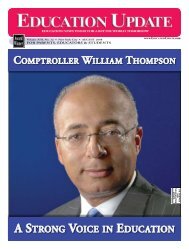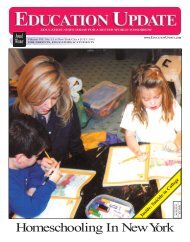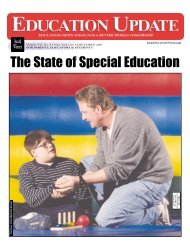Download PDF - Education Update
Download PDF - Education Update
Download PDF - Education Update
Create successful ePaper yourself
Turn your PDF publications into a flip-book with our unique Google optimized e-Paper software.
2 <strong>Education</strong> update ■ For Parents, Educators & Students ■ NOV/DEC 2010Steps to Fix Our SchoolsBy Randi Weingartenf you dropped into the educationdebate by watching “Waitingfor ‘Superman,’” you would thinkAmerica’s public school system ishopelessly broken. As a teacher, the formerpresident of the New York City teachers unionand, now, a national union president, I have spentthousands of hours in schools across the countryand around the globe. I’ve seen countless successstories that rarely make headlines, and that toooften are eclipsed by sensational stories of schoolfailure or by the alluring but empty promise ofthe latest educational fad.No one—certainly no one whose life’s work isin education—is satisfied with the current stateof the American system of public education. And,while great things are happening in many publicschools, often in places where you would leastexpect it, there is no doubt that we have to replicateand scale up such successes to ensure thatevery child, in every public school, has access tothe kind of education that prepares him or her forlife, college and career in today’s global knowledgeeconomy.The question is how do we do this? In my yearsof looking at best practices around the countryand in the nations that outperform us, it hasbecome very clear what the foundations are forbuilding a system of public education that providesall children with the great education theyneed and deserve.Collaboration matters. The AmericanFederation of Teachers regularly brings togetherteams—comprised of administrators, teachers,union leaders and elected officials—to worktogether on pressing education issues and tolearn from effective districts. While the focus inthese successful districts varies, the characteristicthey have in common is that their work is rootedin collaboration.Great teachers can be developed. Most teachersdon’t hit their stride until long after dayone. The American Federation of Teachers hasworked with experts and educators to create aframework for teacher development and evaluationthat is being implemented in more than50 school districts. Its purpose is to enable newand struggling teachers to improve, to help goodteachers become great, and to identify those whoshould not be in the profession. Nearly half of allteachers leave teaching in their first five years, achurning that costs American school systems $7billion annually. Turnover has a steep educationalprice tag as well. The countries that consistentlyoutperform the United States understand this, andinvest in training and retaining teachers.Teachers need tools and support. Educatorscan’t do their jobs well without opportunitiesfor meaningful professional development, aneffective curriculum and adequate working conditions.Similarly, high standards are important,but they are just a start. The American Federationof Teachers supports the Common Core StateStandards, which more than 30 states eitherhave adopted or plan to adopt. If implementedproperly (no sure thing in this time of austerity),these standards can help correct the legacies ofNo Child Left Behind—a narrowing of the curriculumand an overemphasis on standardizedtests. But such standards are meaningless withouttraining and assessments aligned to them and,crucially, without time for teachers to prepare andfor students to achieve them.We must demand 360-degree accountability andresponsibility. Everyone with responsibility forour children’s education and well-being, includingteachers, administrators, elected officials,parents and students, should be held accountable.Teachers can’t do this alone. Public schoolshave an obligation to help all children learn,regardless of parental engagement, native languageor family income. But teachers can’t doit all, especially in this time of economic crisis.That’s why a safe and secure environment, and“wraparound services” to ensure kids have accessto after-school programs, health services andtutoring, are so essential.We must keep the public in public schools.Strong schools help create vibrant communities,and engaged communities in turn help ourschools thrive. Parents, faith communities, businessleaders and others are crucial to a successfulpublic school system. All must be partners inGUEST EDITORIALSDon’t Let Charter EnthusiasmSmother Public SchoolsBy Jennifer J. Raabo movie in recent memory has hadquite the impact or made the samepublic contribution as “Waiting forSuperman.” It has touched the heartsand minds of everyone who has seen it. It hasstimulated an important national conversationabout the quality of education. And it has givenGeoffrey Canada the prominence he has longdeserved. He is one of my heroes, and a hero toeveryone who cares about improving schools.Charter schools are an important addition toAmerican education. They give parents choicesfor their children, and they give the childrenhigh quality schooling. The best of the chartersoutperform traditional public schools that havethe same demographics; their graduation rates arebetter, and their students have a higher probabilityof attending college.But the film’s message must be kept in perspective.Traditional public schools are still where thevast majority of children get their educations, andthat will always be the case. More to the point,many public schools are very good — and someare truly amazing. The fact that some do a poorjob of educating their students shouldn’t blind usto this crucial fact or cause us to lose faith in theentire system. In the drive for educational reform,let’s not throw the baby out with the bathwater.I say this as the president of a college that hasone of the oldest education schools in the country;Hunter has been sending well-trained and highlymotivated teachers into public schools for generations,and all of us at the college are immenselyproud of their contributions. I also say it as themother of a daughter who has been in publicschools K-12 and who has received an excellenteducation there. She has had some truly wonderful,dedicated teachers — an experience shared bycountless thousands of other students across theensuring that every child gets a great education.No one who works in education will be satisfieduntil all students are prepared for the demands ofour ever-changing knowledge economy. Gettingthere, particularly during one of the toughesteconomic downturns of our time, will require thatwe all do more—and do it together .#Randi Weingarten is president of the AmericanFederation of Teachers.nation every year.It is right — it is imperative — that we as anation focus on the parts of the public schoolsystem that are dysfunctional and dedicate ourselvesto fixing them. But it would be a seriousmistake to assume that the system is completelybroken. Making that assumption can only lead tomisguided policies and poor decisions.Instead, we need to appreciate the public schoolteachers who are doing a great job. We needto learn what works in schools, then support itand replicate it. And, as Secretary of <strong>Education</strong>Arne Duncan has pointed out, we need to keepimproving the quality of teacher preparation — arole in which, I am proud to say, Hunter is takingnational leadership.I am especially proud of our Teacher U, a collaborationof several educational organizations —including some top-flight charter schools — thatworks on the principle that great teaching can betaught. I am also proud of our digital video programthat tapes student teachers as they interactwith children in classroom settings. The studentteachers and their professors can then reviewwhat went right or wrong, an invaluable trainingtool, and many of the tapes become case studiesfor future student teachers. The list of innovationsgoes on.One of the main purposes of charter schoolsis to create competition for the public system bygiving parents and children choices. That’s a valuablecontribution, no question about it. But let’sremember that charters will always be a supplementto the system, never a replacement. The goalis to improve public schools, not abandon them. #Jennifer J. Raab is president of Hunter College.Richmond, VirginiaKurt Landgraf, ETS Pres. & CEO RefocusesPremier Testing OrganizationTo the Editor:I must say that Mr. Landgraf is a person of greatintegrity and one of the most honest people thatI have met. I worked for him while at DuPontPharmaceuticals. He pushed me to be the bestI could be and mentored me. He helped me toLETTERS TO THE EDITORbelieve in myself as a minority and he was notafraid to push the envelope and make paradigmshifts for people, like me. Thanks Kurt!Horace JeffriesNew York, New YorkClosing the Opportunity GapTo the Editor:Kudos to you, Danielle, for writing this insightfularticle. Opportunity and Access are two keycomponents to help young and older people seebeyond their immediate environments. The exposureto opportunities and the concomitant supportare so essential to helping youth and adultsvisualize positive alternatives and options anddevelop a renewed confidence as they think of themany possibilities within their reach. #Fern KhanBrooklyn, New YorkExclusive Interview with Michelle RheeTo the Editor:I am a New York City principal serving underMayor Bloomberg and Chancellor Klein whoempowered us to transform an “F” school to an“A” school. I loved this article. CongratulationsChancellor Rhee on your work.Dakota Keyes
















